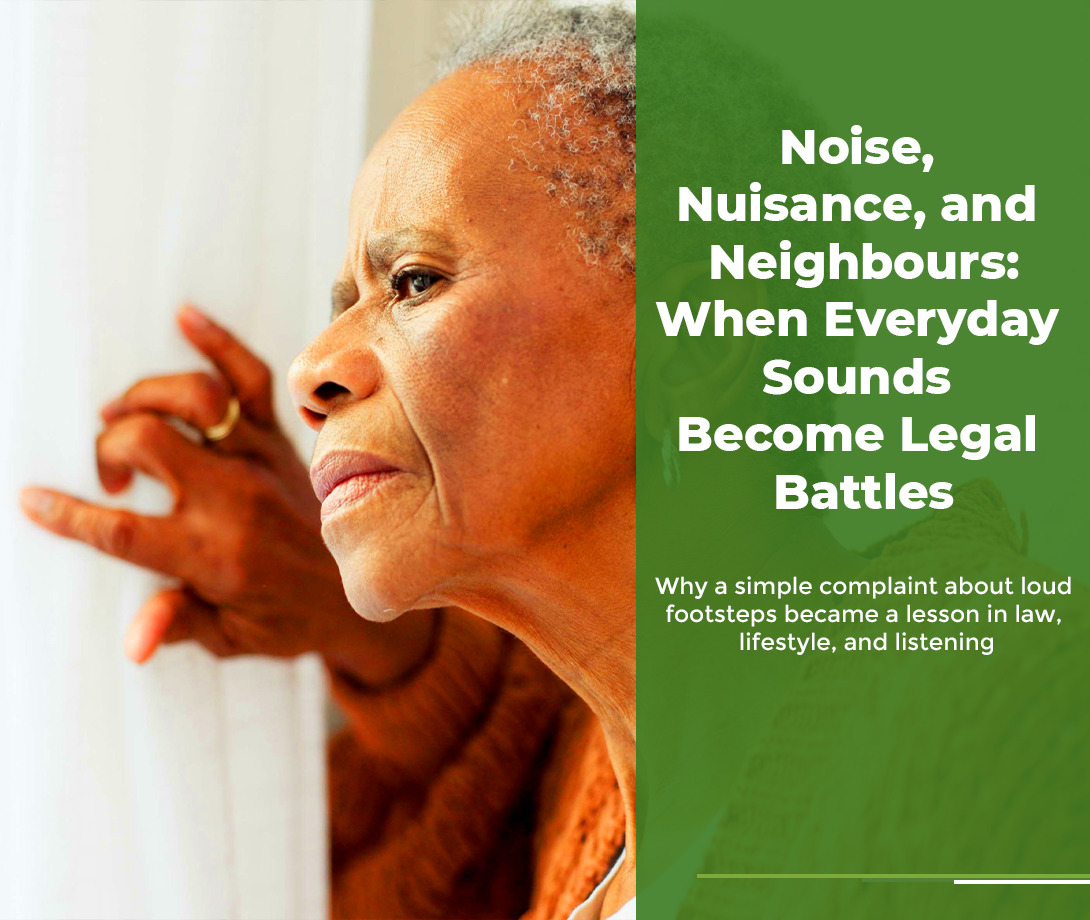Why a simple complaint about loud footsteps became a lesson in law, lifestyle, and listening.
By CSOS Digest Editorial Team
(Estimated read time: 6–7 minutes)
The Night the Music Died (for One Neighbour)
Every Thursday, just after 8 p.m., Mr. Daniels would drop the needle on his old jazz records.
Trumpets sang, the bass hummed, and for him — it was happiness.
But two floors below, Mrs. Mthembu sighed and pulled her pillow over her head. She worked night shifts at the hospital. That same jazz was her alarm clock before bedtime.
After weeks of lost sleep, she wrote to the body corporate:
“Please, I just need quiet. I have to rest for work.”
The trustees sent Mr. Daniels a warning letter. He was upset.
“I’m not throwing parties,” he said. “I’m just listening to my music in my own home. Don’t I have that right?”
And so began what many South Africans know too well — neighbours turning from friendly faces into legal rivals.
Emails flew. Tempers rose. Finally, the case landed before the Community Schemes Ombud Service (CSOS).
The Case: When Sound Becomes a Dispute
Case Reference: CSOS/JHB/0984/25 (fictionalised, based on real cases)
The Complaint:
Mrs. Mthembu said the music, TV, and footsteps broke the rule against “disturbance or nuisance to others.”
The Defence:
Mr. Daniels argued the noise was “normal city living” — and no one had measured how loud it really was.
The Ruling:
The CSOS adjudicator sided with Mrs. Mthembu.
“Reasonableness,” they said, “is about proximity, predictability, and persistence — not just how loud it is.”
Mr. Daniels was told to:
- Lower noise after 9 p.m.
- Add carpets or padding to soften sound.
- Avoid repeated disturbances.
- The body corporate must clearly define its “quiet hours.”
The Human Side: More Than Just Noise
Noise cases are never just about sound.
They’re about respect.
For Mr. Daniels, music was identity — his peace after a long day.
For Mrs. Mthembu, silence was survival — her one chance to rest.
When those needs crash into each other, dignity is what’s really on trial.
Anthropologists call it the “sonic boundary” — the invisible line between my space and our space.
For one person, sound means freedom.
For another, it means intrusion.
And when neighbours stop talking, the first whisper becomes a complaint — and the complaint becomes a case.
Lessons from the CSOS Ruling
| Lesson | What It Means |
| 1️. Reasonableness Is Contextual | What’s okay at 6 p.m. might not be okay at midnight. Fairness depends on time and setting. |
| 2️. Documentation Matters | Keep a note of when, what, and how often the disturbance happens. Facts build fairness. |
| 3️.Mediate Before You Litigate | A calm chat or trustee meeting can fix what a courtroom can’t. |
| 4️.Clear Rules Prevent Chaos | Define quiet hours (e.g., 10 p.m.–6 a.m.) and how the scheme enforces them. |
The Bigger Picture: When Volume Meets Density
| Year | Total CSOS Cases | % Involving Noise/Nuisance | Trend |
| 2020 | 4 800 | 10% | Lockdown tension made homes noisier |
| 2022 | 6 100 | 14% | Hybrid work = more daily noise |
| 2024 | 7 200 | 18% | Rise in behavioural & “impact noise” cases |
CSOS Insight:
Noise disputes aren’t increasing because people are louder — they’re rising because tolerance is shrinking.
In crowded buildings and digital lives, “sound is the new smoke.”
A little is fine. Too much shared without care becomes toxic.
What This Means for You
For Trustees
- Set clear quiet hours and steps for action: warning → mediation → CSOS referral.
- Train trustees to tell the difference between normal life and nuisance.
For Residents
- Remember: walls and ceilings carry more than paint — they carry sound.
- Approach gently: “Can we find a balance?” works better than “You’re breaking rules!”
For Managing Agents
- Keep a Neighbour Liaison Log for recurring issues.
- Suggest simple acoustic fixes — rugs, seals, underlays.
- Teach respectful co-living in newsletters and welcome packs.
Final Reflection: The Sound of Civility
Noise, like conflict, is part of life.
But escalation? That’s a choice.
Every CSOS ruling reminds us that good governance isn’t about silencing people — it’s about helping them listen.
“The decibel of empathy must always be louder than the volume of ego.”
That’s how communities move from complaints to co-existence — one conversation at a time.
CSOS Digest Takeaway
| Principle | Description |
| Transparency | Define and share quiet hours and rules clearly. |
| Governance | Record incidents fairly and apply rules consistently. |
| Empathy | Accept lifestyle diversity — music, prayer, pets, children. |
| Dialogue | Start with conversation, not confrontation. |
About CSOSlive Digest
CSOSlive Digest tells the human stories behind the laws and lessons of shared living in South Africa. We help trustees, owners, and managing agents build communities where transparency, fairness, and empathy live side by side.
For more information you can visit https://csos.org.za and https://www.csosconnect.org.za


